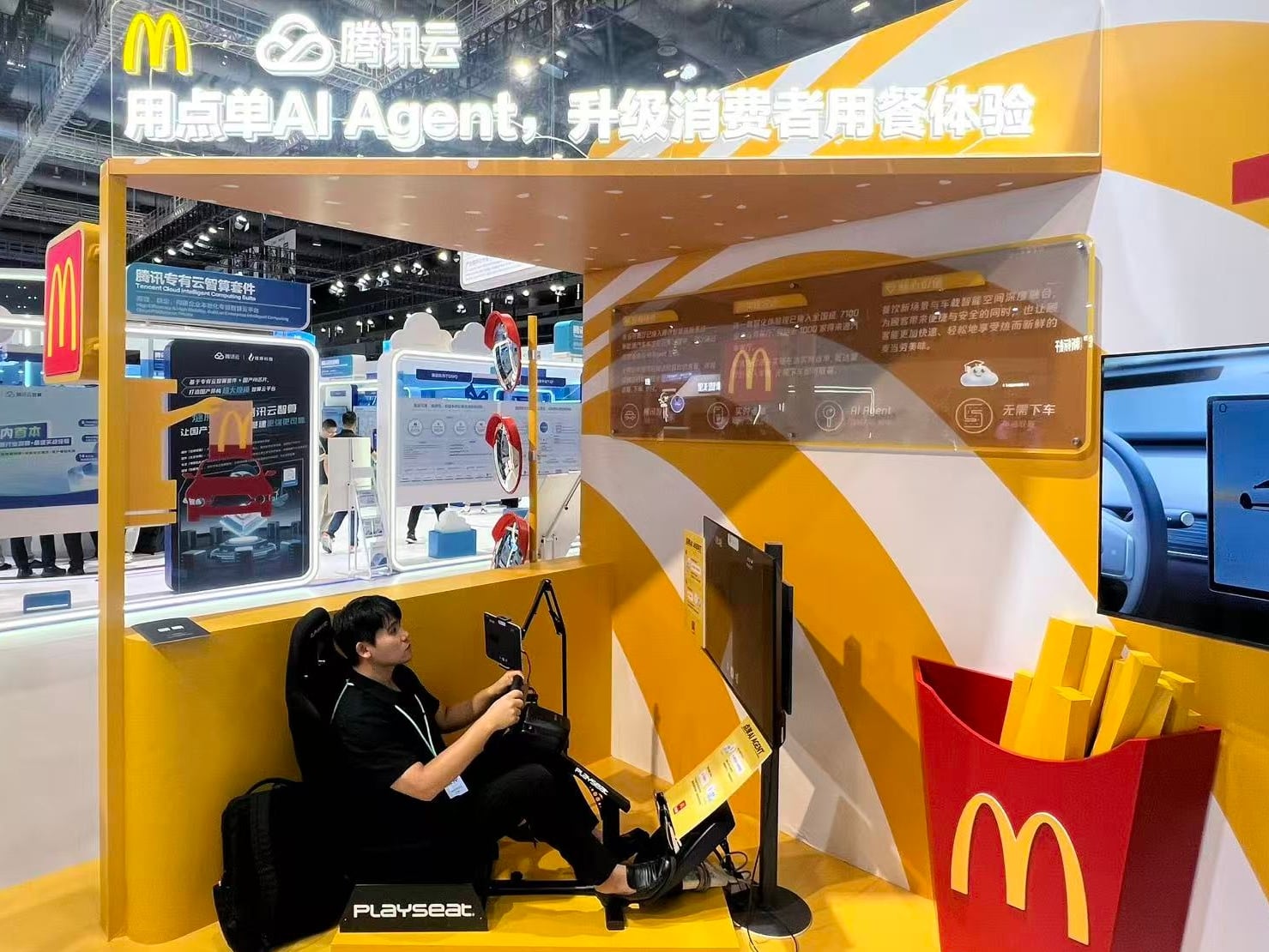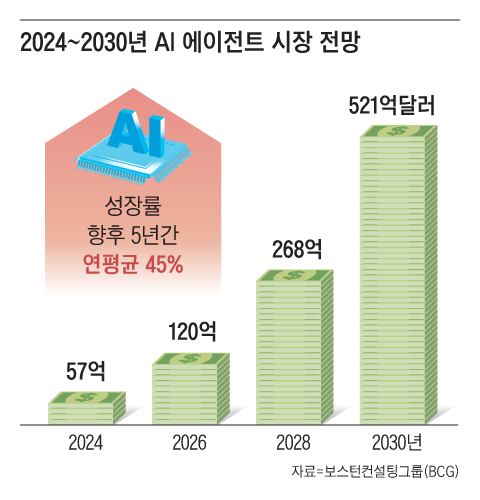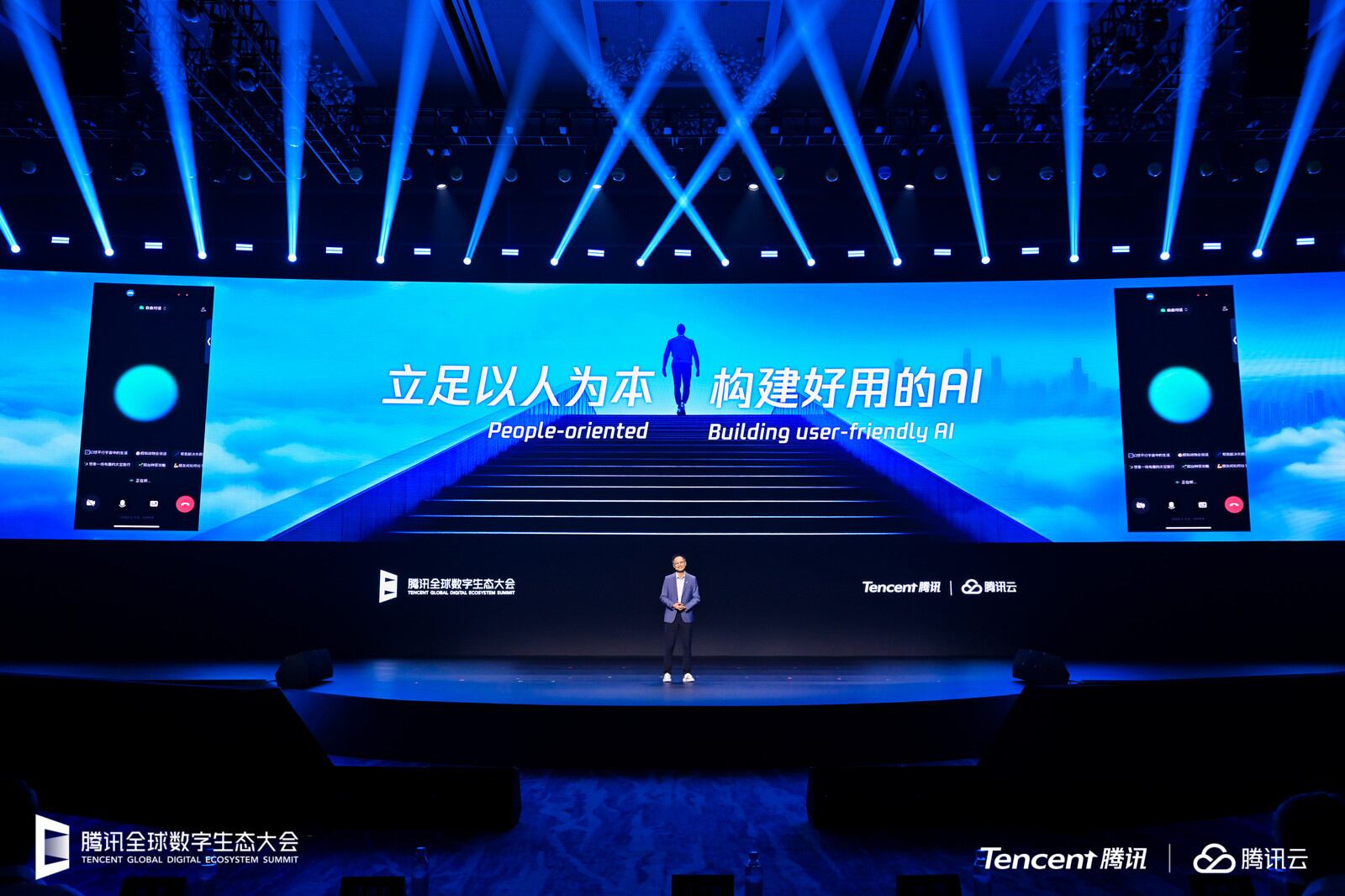
“I want to order a hamburger and chicken….”
On the morning of the 16th at the Shenzhen International Convention Center, Tencent, one of China’s three major IT companies, hosted the ‘Global Digital Eco System Summit (DES).’ At a booth demonstrating McDonald’s AI drive-thru, a model car occupant muttered the request, and Tencent’s developed ‘AI Agent’ recommended three hamburger and chicken menu items while displaying photos on the monitor. After selecting a set menu, the AI Agent informed, “Switching the beverage to ‘black tea’ will cost an additional 2 yuan (approximately 400 Korean won),” and showed the payment window. A booth guide explained, “By linking mobile payments to the app in advance, users can pay automatically like a ‘highway pass’ or by entering a password. This service will be launched within the year.”
Dawson Tong, Tencent vice president, met at the event and stated, “While ‘apps’ were crucial in the mobile era, ‘AI Agents’ are the core in the AI era.” AI Agents, emerging as a new battleground in the global AI race, refer to AI that autonomously performs tasks like a colleague, beyond requiring step-by-step instructions. Examples include an AI that independently drafts corporate credit reports for banks and one responsible for training staff at nationwide pharmacy chains. Eric Li, Tencent Cloud’s head of global commercialization for AI, said, “Tencent has already developed thousands of customized AI Agents for enterprises.” Coincidentally, on the same day, Samsung Electronics held the ‘Samsung AI Forum’ and discussed the topic ‘Beyond Generative AI, Toward Agentic AI.’ This highlights the reality that while China is building an AI Agent ecosystem and boasting the commercialization of thousands of models, South Korea is still in the early stages of adoption.
AI technology has rapidly advanced, shifting focus from machine learning (learning methods), large language models (AI’s backbone), to generative AI (service forms). However, this year marks the beginning of an era where AI exhibits human-like capabilities. OpenAI first equipped ChatGPT with an AI Agent in July, and major companies like Google and Anthropic have since launched dedicated AI Agents. These agents not only retrieve information but also handle reservations, orders, payments, and data collection/analysis.

The Boston Consulting Group (BCG) predicts the AI Agent market will grow at an annual average of 45% from this year to 2030. McKinsey analyzed that AI adoption in key industries—finance, healthcare, manufacturing, retail, and telecommunications—could generate up to $4.4 trillion (approximately 6,000 trillion Korean won) in annual economic value.
Led by Tencent, Chinese big tech companies are overtaking the U.S. with a ‘hyper-speed application’ strategy in the AI Agent sector. They are developing customized professional AI Agents for enterprises and industries, pushing the performance of AI experienced in the real world to its limits. Alibaba released Accio, an AI Agent specialized in global trade, in November last year. Baidu launched Xinxiang, which handles complex personal tasks, in April. Alibaba’s Accio assists small and medium-sized enterprises with market research, regulatory reviews, supplier verification, and comparative analysis for procurement.
Tencent, which declared the ‘AI Application Prosperity Plan,’ recently developed an AI Agent for Dasenlin, a Chinese pharmacy chain. After learning pharmaceutical information and prescription manuals, the AI trains over 50,000 employees at 16,000 pharmacies nationwide. FAW Toyota, a joint venture between FAW and Toyota, has delegated vehicle maintenance and parts replacement services—previously handled by manually searching technical documents—to an AI Agent, processing 17,000 cases monthly. Huaxing Bank outsourced 95% of its corporate credit report writing, a task that previously took over ten days, to an AI Agent.
Tencent highlights ‘a massive platform, customized talent, and diverse AI models’ as its three competitive strengths in the AI Agent field. WeChat, Tencent’s Chinese version of KakaoTalk used by 1.4 billion global users, serves as both a stage and testbed for AI Agents. The app, which integrates dozens of services like messaging, payments, games, and reservations, has no ‘activity barriers’ for AI Agents. Tencent has already applied its AI model, Hunyuan, to over 700 of its services.

Tencent is also actively securing talent specialized in AI Agents. Last week, Bloomberg reported that Yao Sunwei, an OpenAI researcher, moved to Tencent after being offered an annual salary of 2 billion won. Yao has been dedicated to AI Agent research at OpenAI since June of last year. Chinese companies are also competing to hire ‘project managers (PMs) with high technical understanding.’
Under the ‘open ecosystem’ policy, Tencent is accelerating efforts to integrate high-performance domestic AI models, including DeepSeek, into its AI Agents. This involves collecting diverse AI models within China—serving as the engine for AI Agents—and experimenting with tailored deployments. Dawson Tong, Tencent’s senior vice president, said in an interview with this newspaper on the 15th, “We enable customers to choose and utilize various AI models.” Regarding U.S. export controls on advanced semiconductors, which have hindered the development of Chinese AI models, he stated, “Chinese semiconductor companies have already rapidly developed alternatives to NVIDIA chips, and the usage of domestic chips in China has significantly increased over the past 12 months.”
In May, ‘Qiushi (Seeking Truth),’ the theoretical journal of the Communist Party of China, wrote, “Although China’s AI industry investment is smaller than the U.S.’s, it has strengths such as a vast population, rich application environments, and a rapidly evolving corporate ecosystem.” This reflects China’s determination to focus on ‘rapid application’ as a core strategy to intensively foster AI, even if it lags behind the U.S. in capital and basic research.
☞AI Agent
AI that autonomously performs complex tasks. Unlike conventional AI, which provides one-time answers to commands (prompts), AI Agents achieve goals by making independent judgments based on broad instructions. Sam Altman, OpenAI’s CEO, defined it as a “colleague who can collaborate on projects,” and IBM’s March report stated, “The innovative discourse dominating 2025 is AI Agents.”
Post a Comment